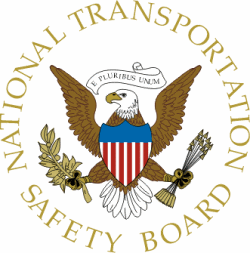Follows Investigations Of Five Accidents Around the Country
The NTSB has issued two safety recommendations to the FAA addressing emergency identification and response training for air traffic controllers derived from its investigations of five accidents.

The NTSB concludes that, based on the accident investigations, the current training provided to air traffic controllers is not effective in preparing them to provide appropriate assistance to aircraft in distress.
The NTSB further concludes that recurrent national training for controllers specifically addressing the identification of common emergencies such as those in the accidents, illustrated with current, real-life examples, and explaining how best to help pilots facing such events would ensure that controllers are well equipped to help pilots in emergency situations.
The NTSB believes that when developing the topics covered and the content of the emergency response training for controllers, the FAA would benefit from coordinating with the offices within its Air Traffic Organization, Flight Standards Service, and Accident Investigation and Prevention organizations that investigate aviation accidents and incidents, and also with organizations familiar with the challenges facing pilots confronting emergency situations, such as the Aircraft Owners and Pilots Association and the General Aviation Joint Steering Committee. These organizations should be consulted to determine the situations in which pilots would benefit from the assistance of controllers and the most appropriate and valuable assistance controllers could provide to resolve the emergency.
These organizations can also provide valuable information on common aircraft system failures and common ways that a pilot might characterize these failures to a controller.
Therefore, the NTSB recommends that the FAA develop, in collaboration with its internal offices that investigate aviation accidents and incidents and also organizations familiar with the challenges facing pilots confronting an emergency situation, and require recurrent national training for air traffic controllers, including scenario-based training, to instruct them on identifying and responding to emergency situations to include the following:
- recognizing emergencies,
- determining what help is needed, and
- taking actions that help pilots safely resolve the situation.
The NTSB also recommends that the FAA, in collaboration with its internal offices that investigate aviation accidents and incidents and also organizations familiar with the challenges facing pilots confronting an emergency situation, annually revise the required training described in Safety Recommendation A-16-18 at the national level to ensure that the training is current and relevant and includes lessons learned from recent events throughout the National Airspace System that address best practices for helping pilots who are experiencing problems such as (but not limited to) the following:
- partial or total power loss and fuel emergencies;
- control difficulties;
- impaired navigational capability;
- loss of flight instruments or other critical aircraft systems (including attitude information);
- encounters with hazardous meteorological conditions;
- inadvertent flight into instrument meteorological conditions by visual flight rules pilots; and
- pilot medical issues, such as hypoxia.
In addition to national training, ATC facilities would continue to provide training for controllers on issues specific to their geographic areas of responsibility. NTSB investigators have visited several ATC facilities to discuss some of these real-life emergency situations with controllers, who indicated that the examples helped them better understand how to handle such situations in the future.
(Source: NTSB)
 ANN's Daily Aero-Term (05.05.24): Omnidirectional Approach Lighting System
ANN's Daily Aero-Term (05.05.24): Omnidirectional Approach Lighting System Aero-News: Quote of the Day (05.05.24)
Aero-News: Quote of the Day (05.05.24) Airborne 05.06.24: Gone West-Dick Rutan, ICON BK Update, SpaceX EVA Suit
Airborne 05.06.24: Gone West-Dick Rutan, ICON BK Update, SpaceX EVA Suit Airborne 05.03.24: Advanced Powerplant Solutions, PRA Runway Woes, Drone Racing
Airborne 05.03.24: Advanced Powerplant Solutions, PRA Runway Woes, Drone Racing Aero-News: Quote of the Day (05.06xx.24)
Aero-News: Quote of the Day (05.06xx.24)



